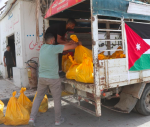You are here
Learning from COVID to fight drug-resistant disease
Jul 07,2021 - Last updated at Jul 07,2021
BOSTON — After over a year of pandemic, there is no shortage of “what-if” questions one could pose. What if we had started out with better surveillance and data sharing? What if governments and international health agencies had acted differently? We cannot turn back the clock, but we can and must consider the lessons learned, so that we can apply them to the next great global health challenge: antimicrobial resistance (AMR).
Around the world, hospitals are reporting more and more drug-resistant infections, and we are reaching the point where we no longer will be able to control the steady rise in cases. The widespread and unnecessary use of antibiotics in livestock production has created a massive incubator for new AMR bugs, while major pharmaceutical companies have abandoned the pursuit of new therapies to combat drug resistance. And, completing the perfect storm, the lack of regulation in most countries has fueled overuse of antibiotics in health-care settings.
The problem is most acute in low- and middle-income countries (LMICs). The COVID-19 pandemic has shown us that public-health crises have vastly unequal effects across socioeconomic groups, both within and between countries. From New York to New Delhi, marginalised and disadvantaged communities have borne the brunt of the pandemic and its economic fallout, and it is they who will suffer disproportionately from AMR.
Moreover, AMR is more likely to emerge in LMICs, owing to the lack of robust prescription laws, high infectious-disease burdens, poor-quality drugs, unregulated use of antibiotics in animals, and inadequate sewage and wastewater management. Even before COVID-19, outbreaks ofdrug-resistant typhoid were not uncommon in South Asia, East Asia, and South America. And now, there is evidence that antibiotic use increased even more in LMICs during the early phase of the pandemic.
To prevent AMR, we must raise awareness about the threat it poses. Public awareness about what antibiotics do and do not do, and when they should or should not be used, is one of the most potent health tools that we have. Here, the COVID-19 crisis has created a unique opportunity for health ministers, public-health experts, and local doctors to engage more closely with the general public. For the first time in most LMICs, science and public health have taken centre stage. Health professionals are routinely interviewed by news media, and a growing audience is eager to hear their advice.
The global public-health community must capitalise on the funding that is pouring into health care through markets and from government spending packages. The pandemic has created a new appetite for investments in health infrastructure, systemic reforms and stronger regulations. For example, by the end of 2020, Pakistan’s Ehsaas social safety net programme (which also provides health services) had beenexpanded to reach 45 per cent of the population, and the Philippines’ Social Amelioration Programme was covering 78 per cent of the country’s people.
Such investments could dry up after the pandemic, so the moment is ripe for public-health advocates to press the case for action against AMR. After all, COVID-19 has also underscored the need for stronger surveillance and pandemic-response systems. In South Korea and other countries where testing was already accessible and affordable, the virus was much more manageable than in countries that have never invested in these assets. The same will be true for AMR.
Equally important is data sharing. Now that the World Health Organisation has created a database of ongoing COVID-19 research, we should consider how similar platforms might be used to gather data and detect AMR in LMICs. By simply repurposing existing infrastructure, public-health authorities could go a long way towards preparing for drug-resistant disease outbreaks.
The COVID-19 crisis also should prompt us to re-evaluate our food systems. We must institute stronger regulatory frameworks to account for public-health guidelines, rather than simply the concerns of profit-driven corporations. Loopholes allowing for the unfettered use of antibiotics in livestock across LMICs have ensured that this dangerous practice remains widespread. There is already evidence of extensively drug-resistant bacteria emerging in Chinese and Indian animal farms, and these two countries certainly are no exception.
COVID-19 has taught us that it is only a matter of time (days, weeks, or months, at most) before a novel contagion spreads from one region to another. We already have the data needed to create appropriate policies that both agri-businesses and public-health advocates can agree on. Now that COVID-19 has heightened our appreciation of the risks that AMR could pose, new regulatory frameworks should be adopted in earnest.
The rapid development of COVID-19 vaccines offers grounds for renewed hope and investment. While new, the mRNA vaccines were built on decades of scientific research that also could be used to develop new antibiotics or bacteriophage therapies. But we need a clearer set of economic incentives and more effective models for structuring partnerships between government agencies, academia, start-ups, and pharmaceutical companies. In addition to developing and rigorously testing promising new therapies, we also must ensure that they are made widely available and accessible to all.
Finally, we must push back on health nationalism. Walls, “me-first” trade policies, and pay-to-play schemes are not just immoral but self-defeating, because bacteria and viruses do not observe national borders or subject themselves to customs checks. Access to high-quality health care is a fundamental human right that must be upheld. The best way to prepare for the next global health crisis is to pursue universal health coverage, recognising that we all benefit when everyone has access to tests, therapies, and vaccines.
Muhammad Hamid Zaman is professor of Biomedical Engineering and International Health at Boston University and the author of “Biography of Resistance: The Epic Battle Between People and Pathogens”. Copyright: Project Syndicate, 2021.












